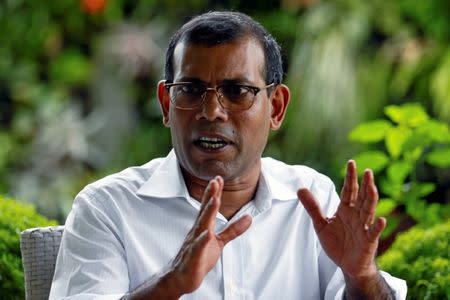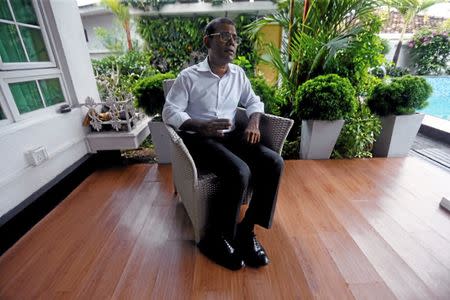Maldives ex-president Nasheed withdraws from September presidential poll
By Mohamed Junayd
MALE (Reuters) - Maldives former president Mohamed Nasheed announced on Friday that he was withdrawing as the main opposition party's candidate for a presidential election in September after the national election commission ruled him illegible to run.
In a tweet, Nasheed, Maldives first democratically-elected leader who lives in exile in Sri Lanka, said he had decided to relinquish his presidential ticket and would formally announce this on Saturday at the congress of his Maldivian Democratic Party.
"The EC's (election commission) decision is illegal and they must be sanctioned," he tweeted.
The Maldives, home to 400,000 people and best known as a tropical paradise for tourists, has experienced political unrest since Nasheed, was forced to quit amid a mutiny by police in 2012.
Nasheed, convicted of terrorism charges in 2015 and sentenced to 13 years in prison after a controversial and widely criticised trial, was the sole candidate when the MDP held a primary election in May.
Although he campaigned for the primary from Sri Lanka to win 43,922 of the 44,011 votes cast, the Elections Commission declined to accept the results and vowed to take action against the MDP.
The European Union and some Western nations in June urged the Maldives to hold a credible and transparent presidential poll, after police executing a court order broke up an opposition effort to pick a candidate for the September election.
Earlier the Maldives foreign ministry said it was vital that all political parties conduct their business responsibly in accordance with the constitution.
The administration of President Abdulla Yameen has rejected a demand by a U.N. human rights watchdog to let Nasheed stand for the presidential election.
The opposition has accused the government of locking up most of the leaders who could effectively challenge Yameen's bid to be re-elected for a second five-year term, a charge the government denies.
The Indian Ocean island chain has faced upheavals since February, when Yameen imposed a state of emergency to annul a Supreme Court ruling that quashed the convictions of nine opposition leaders, including Nasheed.
During the 45-day emergency, Yameen's administration arrested former president Maumoon Abdul Gayoom, the chief justice, another Supreme Court judge and a Supreme Court administrator on charges of trying to overthrow the government.
In 2016, Nasheed was allowed to go on medical leave to Britain, where he received political asylum. Since last year, he has been in Sri Lanka, working to unite opposition parties to defeat Yameen.
(Writing by Ranga Sirilal; Editing by Richard Balmforth)



